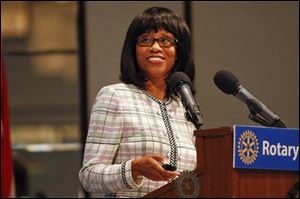
Mercy CEO sees ‘perfect storm’ in health care
Plans should be simpler, Price tells Rotary Club
8/19/2013
Andrea Price, Mercy president and CEO, speaks to members of the Toledo Rotary Club about challenges facing the hospital industry.
“An economic perfect storm is coming” in the health-care industry, Mercy’s top executive told a luncheon audience of businessmen and professionals Monday.
“My industry is one of the most complex in the country today,” Andrea R. Price, Mercy’s president and chief executive officer, said during a Rotary Club of Toledo address. “It’s also definitely one of the most highly debated.”
The conundrum Americans face now as they struggle to pay for health care was, in some ways, predictable. Demographers for years have anticipated a greater stress on society as the Baby Boom population reaches retirement age, with health-care costs now estimated at $13,000 a year for those 65 years and older.
But few people saw the perfect storm that’s emerging in the health-care industry.
Not only are people spending too much of their income on health care, but those who provide the services are under pressure to do more with less, Ms. Price said.
At the same time America’s sluggish economy forced more people to sink into poverty, federal payments to health-care providers are being reduced, she said.
The health-care industry, Ms. Price said, is not like an ordinary business. It cannot simply cut services in proportion to declines in the revenue stream, she said; services must be maintained, if not improved, despite rising costs.
The trend of somehow providing more with less will likely continue as the population grows and as the art of medicine, through better technology, more research, and pharmaceuticals, succeeds in helping people live longer, Ms. Price said.
“There’s a way out of it, but it’s not going to be as quick or as simple as people think,” she told The Blade in an interview following her presentation.
She told the audience that recent media reports, including a Wall Street Journal story this month that details widespread confusion about how health-care plans work, should be a wake-up call.
“We shouldn’t try to explain complex plans in simpler terms. We should have simpler plans,” Ms. Price said.
She said the health-care industry, now paid by the volume of tests it performs, treatments it gives, and other services it provides, is on the verge of being compensated by a more value-based system. The value of services are defined in federal guidelines, she said.
With millions of Americans uninsured, Ms. Price said she is “very supportive” of Medicaid expansion. She also is a proponent of the Patient Protection and Affordable Care Act that President Obama signed into law in 2010.
“It’s really unfortunate in this country that there are people unable to pay for services that are needed,” she said. “That doesn’t speak well for our country.”
Mercy has more than 7,500 employees, 1,350 medical staff members, and $900 million in net revenues.
Ms. Price was hired in 2009 as chief operating officer. The following year, she was promoted to its top position.
She was named by Modern Healthcare Magazine in 2008 as one of the industry’s Top 25 minority executives.
Contact Tom Henry at: thenry@theblade.com or 419-724-6079.